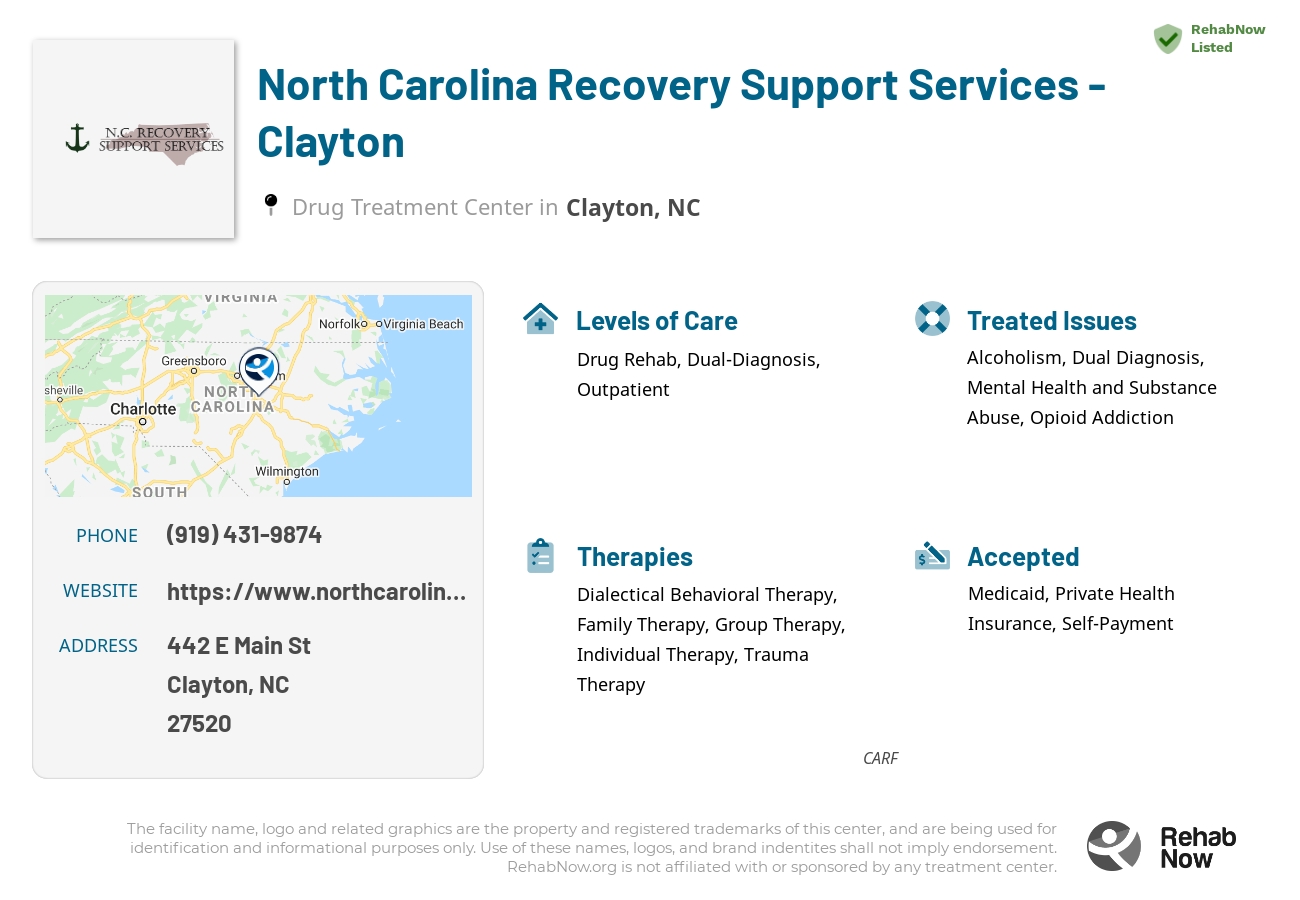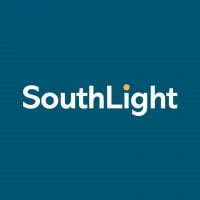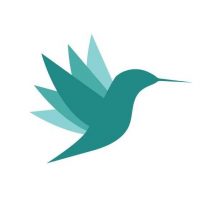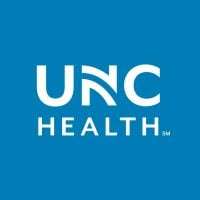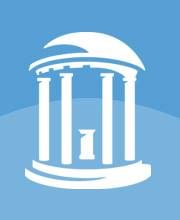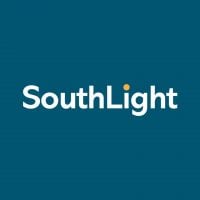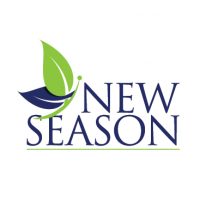North Carolina Recovery Support Services - Clayton
Drug Rehab Center in Clayton, North Carolina
Clayton Drug Rehab offers accredited, tailored care for individuals seeking sobriety in North Carolina, with a variety of options ranging from outpatient to inpatient treatment, expertly guided by experienced staff members.
About This Clayton, NC Facility
North Carolina Recovery Support Services - Clayton is an addiction treatment facility located in Clayton, North Carolina. Established in 2004, this facility is dedicated to helping individuals suffering from alcoholism, opioid addiction, dual diagnosis, drug addiction, and mental health disorders. North Carolina Recovery Support Services - Clayton offers a variety of treatment options, including drug rehab, dual-diagnosis treatment, outpatient programs, inpatient care, and residential levels of care. They are accredited by the Commission on Accreditation of Rehabilitation Facilities (CARF), which ensures that their services meet high-quality standards and are effective in addressing addiction and mental health issues.
At North Carolina Recovery Support Services - Clayton, individuals struggling with substance abuse can access a range of comprehensive services to aid their recovery journey. These services include personalized treatment plans tailored to meet the unique needs of each patient, evidence-based therapies such as cognitive-behavioral therapy and motivational interviewing, medication-assisted treatment for opioid addiction, relapse prevention programs, group therapy sessions, family counseling, and aftercare support. With a focus on holistic wellness, their programs aim to address both the physical and psychological aspects of addiction, fostering long-term recovery and improved overall well-being.
Genders
Ages
Modality
Additional
Accreditations

CARF
The Commission on Accreditation of Rehabilitation Facilities (CARF) is a non-profit organization that specifically accredits rehab organizations. Founded in 1966, CARF's, mission is to help service providers like rehab facilities maintain high standards of care.
Conditions and Issues Treated
Opioid addiction involves addiction to legal or illegal opioids. It may happen very quickly with any opioid use. Sometimes within a matter of days. Opioid addiction is a known as a high-risk factor for future heroin addiction.
Opioid withdrawal can be extremely uncomfortable and lead the user to continue to use even if they want to quit. Stopping using an opioid requires careful medical observation. Sometimes the withdrawal can persist for many weeks, which can put the user at a high risk for relapse.
It is recommended to receive inpatient treatment and a medically supervised detox like those offered at North Carolina Recovery Support Services - Clayton in Clayton, NC, NC, to manage the withdrawal process while learning lasting tools to maintain recovery. In some circumstances medications can be used to manage opioid addiction.
People with dual diagnosis have coexisting addiction and a mental disorder. 9.2 million US adults had a co-occurring disorder in 2018, so not just limited to North Carolina residents. Best treatment combines medication, psychotherapy (talk therapy), support group, and inpatient rehabilitation. Sometimes, complementary therapies – yoga, massage, and acupuncture – may also be used.
Levels of Care Offered
This center offers a variety of custom treatment tailored to individual recovery. Currently available are Drug Rehab, Dual-Diagnosis, Inpatient, Outpatient, Residential, with additional therapies available as listed below.
Inpatient rehab is intended to treat severe addictions and co-occurring disorders. The length of stay in North Carolina varies from four weeks to six months according to the individual needs. Inpatient rehab ensures that the patient stays in a substance-free environment at North Carolina Recovery Support Services - Clayton.
Outpatient treatment can be considered the lowest intensity level of addiction treatment in Clayton, NC. It is ideal for early phase addiction or lower intensity addictions. North Carolina Recovery Support Services - Clayton peer group support, 12-step programs, and individual counseling may still be involved.
Residential treatment programs are those that offer housing and meals in addition to substance abuse treatment. Rehab facilities that offer residential treatment allow patients to focus solely on recovery, in an environment totally separate from their lives. Some rehab centers specialize in short-term residential treatment (a few days to a week or two), while others solely provide treatment on a long-term basis (several weeks to months). Some offer both, and tailor treatment to the patient’s individual requirements.
North Carolina Recovery Support Services - Clayton‘s Therapies & Programs
Individual therapy aims to identify the core issues that would have led the patient to substance abuse and address the root cause effectively. Patients find the therapist as a person who they can trust. It helps them to open up and discuss personal and sensitive issues, which they may not be comfortable discussing in a group.
Family therapy is a set of therapeutic approaches that assumes that the entire family is a system. It utilizes the strengths and resources of the family to help the patient refrain from resorting to substance abuse. It helps to repair relationships and improve communication between family members.
Group therapy happens at North Carolina Recovery Support Services - Clayton in a controlled group environment, as opposed to a one-on-one setting. It supports Clayton, NC patients’ recovery by offering a sense of comfort and letting them know that they are not alone. Through shared conversations, patients also learn to develop faith and understanding and gain insight on their addictions.
Unresolved trauma is often a key reason why many patients resorted to substance abuse. Trauma therapy refers to treatment wherein specialist therapists help the patients to resolve the trauma that led the patients to substance abuse. The trauma could be physical abuse, sexual abuse, war, natural disasters, divorce, accident, loss of a loved one, etc. Thinking of these traumatic events causes emotional disturbances like anxiety, depression and results in addiction. If trauma is the primary cause of substance abuse, then both issues must be addressed. Otherwise, there is a risk of relapse. Trauma therapy also improves the cognitive functions and provides long term benefits.
Dialectical Behavior Therapy (DBT) is an improved version of Cognitive Behavioral Therapy (CBT). DBT is a treatment of choice for people suffering from self-harming behaviors characterized by cutting and suicidal thoughts or inclinations.
This treatment is developed to help individuals recognize their thought patterns, behaviors, and feelings. It has demonstrated its effectiveness for people that are finding it difficult to control their emotions and urges. Conditions such as obsessive-compulsive disorder and borderline personality disorder also benefit from DBT as it imparts individuals stress-management techniques and enhanced self-esteem so they can sustain their sobriety by reducing the impact of triggers and out-of-control emotions.
Rational Emotive Behavior Therapy (REBT) sees a person suffering from substance addiction to have illogical reasoning, counterproductive actions, and does not see things clearly. Due to this, REBT deals with cognition, images, and behavior extensively to rectify the client’s bad habits. REBT pushes an individual to become more reasonable and choose a life without the repercussions of addictions.
Patients at North Carolina Recovery Support Services - Clayton in Clayton, NC learn how to self-soothe by conducting rational self-counseling. REBT provides their patients with the skill sets necessary in handling problems all by themselves, without seeking professional help. The process calls for practice, reiteration, and bolstering the new way of thinking being introduced to the patient.
Payment Options Accepted
For specific insurance or payment methods please contact us.
Is your insurance accepted?
Ask an expert, call (888) 674-0062
Additional Details
Specifics, location, and helpful extra information.
Clayton, North Carolina 27520 Phone Number(919) 431-9874 Meta DetailsUpdated November 25, 2023
Staff Verified
Patient Reviews
There are no reviews yet. Be the first one to write one.
Clayton, North Carolina Addiction Information
North Carolina ranks 29th in the nation for overall substance abuse. Many of the drugs abused in the state are illicit, and many of these are opioids. Prescription opioids are readily available due to the high rates of medical workers prescribing them. The number of prescriptions has increased tenfold since the 1980's. Opioid overdoses are the most common type of death in North Carolina.
Treatment in Nearby Cities
- Black Mountain, NC (217.4 mi.)
- Winterville, NC (59.8 mi.)
- Summerfield, NC (90.0 mi.)
- Black Creek, NC (29.3 mi.)
- Star, NC (76.8 mi.)
Centers near North Carolina Recovery Support Services - Clayton
The facility name, logo and brand are the property and registered trademarks of North Carolina Recovery Support Services - Clayton, and are being used for identification and informational purposes only. Use of these names, logos and brands shall not imply endorsement. RehabNow.org is not affiliated with or sponsored by North Carolina Recovery Support Services - Clayton.



